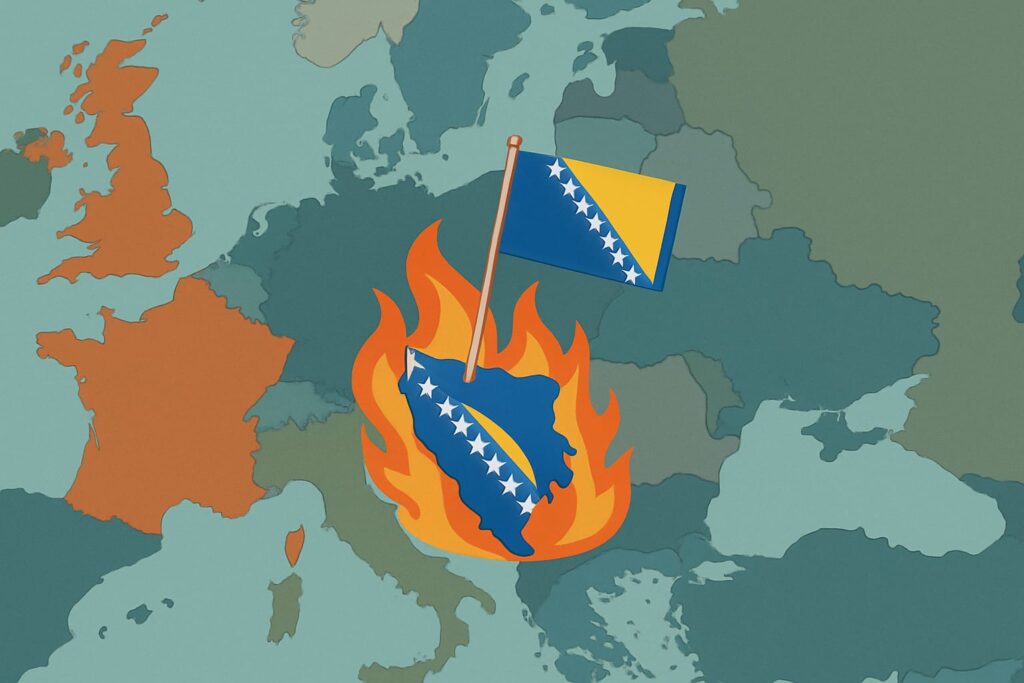
30 Years After Dayton: Peace Maintained, Divisions Deepened
This year marks the 30th anniversary of the Dayton Peace Agreement, which ended the brutal three-year war in Bosnia and Herzegovina – the bloodiest conflict in Europe since World War II. Characterized by mass atrocities, ethnic cleansing, and forced territorial division, the war left deep scars on the country’s fabric.
The agreement created a complex political structure: the Republic of Bosnia and Herzegovina, composed of two entities and three constituent peoples. While economic development and reforms have been limited, the accord at least secured peace and enabled a return to normal life. However, the wounds of war remain open, with national and religious divisions continuing to shape political and social life.
Clashing Visions of the Country’s Future
The political leadership in Banja Luka – the capital of the Serb entity, Republika Srpska—has long pursued greater autonomy, with a long-term aim of secession or unification with Serbia. Many ethnic Serbs see Serbia as their homeland.
In contrast, Bosniak leaders in Sarajevo advocate for stronger central governance and reduced powers of the entities. Within this camp, two currents have emerged: one nationalist, pushing for a unitarian state dominated by the Bosniak majority and Islam; the other civic-oriented, promoting a unified country based on the principle of “one person, one vote.”
Meanwhile, Croats—the third constituent group—are demanding the creation of their own entity to gain more political autonomy and to reduce dependence on the more populous Bosniaks, with whom they currently share the Federation of BiH.
The Dodik Factor: A Threat to State Integrity
Currently seen as the most serious threat to Bosnia’s unity is Milorad Dodik, President of Republika Srpska and leader of the SNSD party. Dodik is under sanctions by the U.S., UK, Germany, and Austria, and has been sentenced in a first-instance ruling to prison and a ban from holding public office for defying decisions of the High Representative.
He rose to power with Western support, ironically, but is now viewed as a destabilizing figure and a close ally of Russia. Numerous reports suggest immense personal and familial wealth linked to clientelism and corruption.
Besides support from Moscow, Dodik reportedly enjoys backing from political actors in Belgrade, Zagreb, Budapest, and certain conservative circles in the West. His close relationship with Dragan Čović, leader of the HDZ BiH, further strengthens a Serb-Croat political axis within Bosnia. Some sources even claim that Dodik has ties to Croatian intelligence services.
The Role of the International Community
Since 1995, the international community has played a key role in safeguarding peace and overseeing Bosnia’s progress. However, with the appointment of German diplomat Christian Schmidt as High Representative, Republika Srpska has challenged the legitimacy of the office and refused to comply with its rulings.
Dodik accuses Schmidt of unilateral decisions that threaten Republika Srpska’s autonomy – highlighting the property law as an alleged attempt at centralization. In response, RS authorities have passed legislation directly undermining the state’s sovereignty, and secessionist rhetoric has become routine.
The situation is further complicated by European geopolitical tensions. Russia has signaled it would protect Dodik if he were to be arrested. According to some sources, a British special forces operation to detain Dodik was allegedly thwarted by Russian intelligence. Dodik is now protected by heavily armed RS police, some of whom have reportedly undergone secret training in Russia. In March, tensions between RS police and Bosnia’s State Investigation and Protection Agency nearly escalated into an armed conflict—sparking fear of a new war.
Sarajevo’s Perspective and Rising Geopolitical Stakes
In Sarajevo, many believe this is the moment to reform the Dayton Constitution – to strengthen central institutions and eliminate veto powers that paralyze governance. The strongest support for this approach comes from the UK, Germany, and Turkey, which positions itself as a protector of Muslims in the Balkans, particularly Bosniaks and Albanians.
Although the U.S. played a pivotal role during and after the war, the Trump administration shifted much of the initiative to European powers. Serbia and Croatia, as Dayton signatories, remain deeply involved – often protecting the interests of their respective ethnic groups in BiH, to the detriment of a functional shared state.
Conclusion: A Crisis with Catastrophic Potential
Any political decision-making must take into account the high level of national tension and the poor economic conditions affecting most Bosnian citizens. The current crisis could easily spiral into a new flashpoint, with potentially tragic consequences.
The combination of political irresponsibility, ethnic and religious hostility, economic stagnation, and foreign geopolitical interference creates a dangerous cocktail that could ignite another conflict – with consequences not only for BiH, but for the entire Western Balkans, Southeastern Europe, and the broader European continent.
It is therefore essential to approach the situation with extreme caution, apply diplomatic tools, and remain open to compromise in order to reduce the risk of renewed conflict on European soil.
